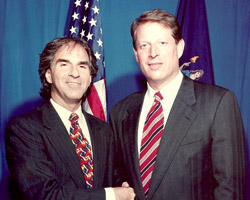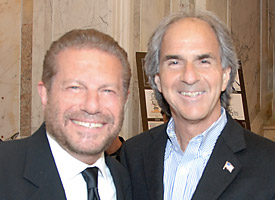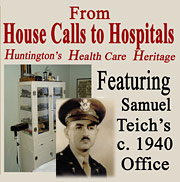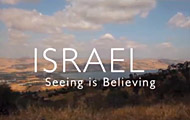By Howard Teich
Published in the Manhattan Sentinel
Rabbi Stein of Congregation Shaaray Tefilah in Manhattan moved his hand signaling the portion of the audience to respond to his reques tthat they individually say the name of someone they had lost the day before, first to the left part of the balcony moving to the right, and then downstairs, left to right, moment by moment, name after name being called out, finally moving during this memorial prayer service to the downstairs lower balcony, to a woman and her young daughter, and the mother’s words responding to his hand, slowly but resiliently and sadly coming from her mouth, “My Husband and her Daddy.”
That said so much about 9-11 at the onset.
And yet, for that young girl, now without a father, we must prepare the kind of world that we have the responsibility of leaving for her, and then for her daughter.
A year ago, a terrorist attack on American soil was carried out using our own commercial planes to hit us in New York and Washington, DC. We’ll always remember t. The President of the United States declared it an act of war, and we went after Afghanistan’s Taliban regime, and its hidden master of terrorism, Bin Laden. That’s the overview.
The human story was really in the streets of New York. Our New York. Mayor Giuliani’s New York. The New York that loved and honored its firefighters, its police, and its EMS personnel, for they were and are our finest, our bravest, and they were and are on the front lines. They were, and are, our hands, our hearts, and our souls.
This has been, and continues to be, a very real time for soul-searching, and as everyone said that America will never be the same, then we must ask ourselves the kind of New York, the kind of America, the kind of Jew, and the kind of human being we want to be, and that we want to create in our time on Earth.
Perhaps we should reflect on the words of our prophet Micah, “It has been told to thee, O Man, What is good, And what the Lord doth require of thee: Only to do justly, and to love mercy, and to walk humbly with thy G-d.”
When the airplanes hit, I set off from my offices in the30’s for the Twin Towers, not knowing what I could do, but knowing that if there was something I could do, then I wanted to be there to do it.
Rabbi Avi Weiss clearly felt the same way, and we found each other at a barricade on the streets of the Village. And then Ron Agam and a friend appeared, and they were there to help, and photograph the tragedy. And we all found each other, and traveled together down to Ground Zero while the fire was continuing.
The streets were covered with white and gray soot and papers. The air and sky were full of smoke and dust. And there were barricades in place everywhere. And other than firefighters, police and emergency medical personnel, there were few other people on the streets. They had all been evacuated.
We made our way to the staging area on West Street, at Stuyvesant High School, and losses were already high for our finest and bravest. Those who were at the staging area knew of their colleagues who were missing or dead, for they were next to them when they first went down to Ground Zero, when they first entered One and Two World Trade Centers to lead people out, and they had survived, and members of their companies, precincts, and squads had not. And they were waiting to go back in, continuing their missions, overcoming any fears, sadness and horror, carrying out their duties and responsibilities.
We were there to help, to share a thought, to be encouraging, to do whatever we could. And to not get in the way of professionals doing their job beyond the call of duty.
Rabbi Weiss and I walked through Battery Park City, and faced directly across West Street, seeing the remnants of a burning World Trade Center, with the wind and smoke and papers everywhere. We could feel the intense heat, and we were a block away. And in front of us were our bravest and finest right on the site. I cannot even imagine what it was like.
Then we did whatever we could. Rabbi Weiss spent his time with the EMS members and the firefighters, speaking with them, and being there for them. Ron was right at Ground Zero capturing that first day in film until late at night. I saw the Salvation Army truck arrive, and spent my time handing out bottles of water, grape juice, and iced tea to the firefighters and emergency personnel for hours. And it was incredible, for they were putting their lives on the line, and we were all thanking them, and they were thanking us for being there for them.
And then I walked uptown as evening arrived, through the streets, relatively numb. Clearly, New York was not the same. And as I sat at an outdoor café later that night having dinner, we all stood to applaud the first fire truck riding past us, giving our salute to our firefighters, our heroes.
We all did what we could that first day. And I couldn’t help but think of the Guiding thoughts of Hillel. “Thou shalt love thy neighbor as thyself” and “What is hateful unto you, do not do unto your neighbor. The rest is commentary.” For that was our New New York. We were all there for each other in the most positive of ways.
I found that first day that I had one personal loss, and that was Father Mychal Judge, Chaplain of the NYC Fire Department, with whom Ihad journeyed to Israel together with Mayor Dinkins and a multi-ethnic, ecumenical leadership group of thirty in 1993.
He lost his life while saying last rights over a firefighter caught in the first collapse of the World Trade Center. His funeral mass was memorable, officiated by Cardinal Egan, the rows of our firefighters there to pay their last respects, and the overflowing crowd filling the church and then the streets.
Father Mychal had selected the primary eulogizer at the funeral, as we were told, for it was part of the Franciscan Way that he had completed a form required by the Order upon his ordination, “On the Occasion of My Death.” And in that eulogy it was said that he died with the Number 1, knowing what was about to happen, and wanting to greet the firefighters and others who were about to follow him, and come to Heaven, and assure them, and comfort them as he did in life.
That’s the goodness of the New York we must remember from those first days, when we stood and cheered for each other, tirelessly helping those who needed help, determined to move to the future, and very proud to be aNew Yorker and an American. We were open with each other in a way that many of us had never seen before. And we were a community in all of New York.
We must never forget that way of being, for we were a special New York. It was a better New York.
And after these months, as the rebuilding begins, we must always remember the spirit of those early days, to ensure that our New New York is truly a model of compassion, unity, and love, and a New York that we can proudly present to that little girl who lost her father, for her daughter and for the generations to follow.






